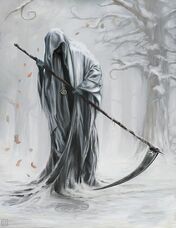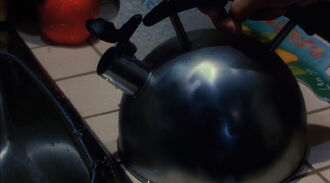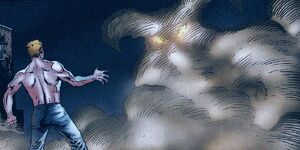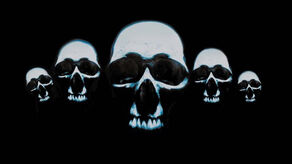This article is about Death in general. For a list of deaths that occurred throughout the Final Destination series, see here.
|
In Death, there are no accidents, no coincidences, no mishaps...and no escapes. William Bludworth, Final Destination. |
In the Final Destination series, Death (also known as The Grim Reaper) is an active, cunning, volatile, highly malevolent, supernatural, personified force and the series' primary antagonist. While invisible to people, it nevertheless makes a somewhat noticeable and ominous presence wherever it goes and can manipulate any aspect of an environment to its will. Although the character of Death is never seen, it is indeed an entity that wants its design to never be violated.
It has been highly suggested that Death essentially programs the events of a person's entire lifespan, ultimately deciding where, when and how they will die. Should anyone deviate or "cheat" from what Death has set for them, whether deliberately or not, Death will then impart a new design and eventually return for them to seek revenge, usually in the worst, most painful way imaginable. Because of this, suicide is practically impossible unless it was indeed that person's time to die. Any attempt to cheat is ultimately futile as it's implied that Death maintains an agenda of some kind in order to keep forces of life and death balanced and will meet that quota one way or another.
Despite this, Death does have a sense (or at least understanding) of honour: notably, unless people die in the specific original vision, Death spares them from any future deaths in its plan to kill the survivors, honouring its specific plans and their unfortunate problems of being caught up as bystanders. As well as this, Death appears to have a sense (or, like with honour, an understanding) of loyalty, equality and forgiveness: notably, Death kills a racist and, to equalise the score, kills off the victim of the racism too. In one instance, when someone who had escaped its plans went back for revenge, Death's understanding of loyalty to friends led to it breaking its own rules and killing that person anyway.
The Final Destination Series

The Grim Reaper: One of the four horsemen of the Apocalypse and iconic personification of Death in Western folklore.
Throughout the series, Death comes in the form of overly complex freak accidents to kill off survivors of a major disaster they were originally supposed to die in as well as in the order they would have died in said disaster. If somebody intervenes in a person's death, then Death will skip that person and move on to the next before returning to that person to complete the rift in its design, although the order has been shown to reverse itself. In Final Destination 2, the death order of those who were supposed to die in the Route 23 pile up was reversed due to the deaths of the Flight 180 survivors.
There are also a few cases where someone's death comes before (or after) another victim on the list for an unexplained reason (Gunter Nonhoff and Eric Prescott most notably). Death will, however, seemingly make implausible situations when someone deliberately trying to commit suicide will ultimately fail, as seen when Eugene Dix tries to shoot himself in the head with a fully loaded six shot revolver, only for every bullet to be a misfire.
Usually there are mysterious clues as to how the next person will die. Its most common form being a brief gust of spontaneous wind. Other clues range from pictures or brief images or signs or an odd formation of something on the ground. The clues could be about anything on how they die (i.e. the word "EYE" for Evan Lewis, a series of cracks in the ground that look like a skeletal hand for Hal Ward, the song "Rocky Mountain High" for various situations, or nothing but a dark, black shadow that appears out of nowhere).

Death seen as a vague black shadowy mass on Valerie Lewton's kettle.
Death also has a handful of servants who unintentionally (in some cases on purpose) kill a person on Death's list. Additionally, Death does not appear to be above killing others to hasten its acquisition of survivors, with Tom Gaines theorizing the entity is perfectly willing to "sneak souls" when the opportunity to do so arises. There have been mixed theories in what Death will do if the survivor with premonitions deliberately kills him/herself despite not being next on the list. Ian McKinley had a theory that, if the last on Death's list (usually the person with the premonitions) kills him/herself, it would ruin Death's plans, since the survivor isn't next to die.
It would throw Death's list away and save everyone else still alive from the accident. In an alternate ending in The Final Destination, Nick kills himself, ruining Death's design. However, at the very end of it, the final two survivors of the McKinley Speedway accident died at the exact same moment, meaning Death will just kill the rest of the survivors without hesitation based on the design they were supposed to die. Or, like what happened to Eugene Dix, the last would not be able to kill themselves
In the alternate ending of Final Destination, Alex saves Clear from an electric wire on the front of the car, therefore, he was caught on fire, and died ruining Death's design. After this, Clear and Carter both lived the rest of their lives in peace, meaning that the final survivors of Flight 180 actually defeated Death. It was not clear on what Death will actually do if this situation happened, since these situations only happened in alternate endings.
It should be noted however that in Final Destination 3 it took five months after Ian's death for Train 081 to happen meaning that in the alternate ending of Final Destination the reason Clear and Carter survived is because the scene showed could have been before five months passed or because Clear gave birth to a baby, as it was mentioned in Final Destination 2 that if someone who was supposed to die in an accident but survived and gave birth all the remaining survivors would live, William Bludworth himself said that "only new life defeats Death".
It should also be noted that Death can be confused. In The Final Destination, Nick's vision showed that Hunt and Janet would die at the same time. Death attempted three times to kill Janet, however, the first time she saved herself, the second time Lori saved her, and the third time, Death was just too late. After this, Janet should have been the last, because she cheated death yet again. However, the order was slightly scrambled, and Janet died between George and Lori. However, it can also be assumed that Death created a new list involving George, Lori, Nick, and Janet.
Many people say that the disaster in the speedway in Final Destination 4 doesn't make sense because of the cars and their parts flying everywhere and also the drivers don't stopping their cars when there's a crash. The theory that makes more sense is that death was controlling the cars so the drivers couldn't stop and that death was also controlling the objects that killed the viewers like the engine that killed Samantha.
Appearance

Death appears before Matt in a cloud of smoke in Final Destination: Spring Break.
Death takes many forms (skulls, shadows, possessed objects that ultimately kill their victims) but its most notable form (which was in the novel Final Destination: Looks Could Kill) was an elderly African American male who wears a gray suit, has shiny white teeth, gray hair, and a cane with a skull on the end; Death adopts a form similar to this one in a dream Kate Shelley has in Final Destination: End of the Line, implicating it may be its preferred one when dealing directly with mortals. However, Death being written off as a skeleton with a black cape and scythe (the Grim Reaper) is merely a stereotype.
Death's true form (according to a dream Jessica Golden and Macy had in Final Destination: Dead Reckoning) may be a massive abomination composed of decaying, shifting corpses and bones from thousands of species. In Final Destination: Spring Break, Death can be seen as a giant cloud of smoke. In the Final Destination film series, Death is never physically shown but its presence is known when there is a sudden large gust of wind or when it casts a large, dark shadow.
Defeated
- In Final Destination's alternative ending, it is possible that death loses it‘s power or became stuck in a death loot that can never kill people anymore, and in the alternative ending, when wind in Alex Jr.’s room blows, with vents off and window closed, Clear calls out Alex, meaning that Alex becomes replaced by the original death and became death(or god), instead killing innocents, Alex plays for his child.
- Kimberly and Thomas are the only ones who have officially defeated death. When the hospital room explodes, Thomas is clearly pushed down by Kimberly because if she didn't push him down, then Thomas would have been killed by the impact of the flying shelf and incinerated, and if that were to happen, Kimberly would drown and would die which would result in them failing to stop death.
- Sherry Pulanski thought she had defeated death after saving her best friend and breaking her deal, but ultimately Death tricked her again and killed her at the end.
Trivia
- Kimberly Corman and Thomas Burke are the only two people who managed to cheat Death in the entire series.
- Series creator Jeffrey Reddick stated in an interview that in the first draft for the first movie, Death was supposed to appear for a moment near the end of the film, but it was later decided by the crew that the entity would not be fully seen.
- It is questioned by fans why characters in the Final Destination franchise die such violent and gruesome deaths. It's very possible that this is Death's way of punishing those who violate his design or intend to do it (and possibly to show the rest of the world not to mess with it).
- In the Final Destination 3 Novel, Wendy concludes that Death is indeed a malicous entity as she notices Death always kills off people right in front of her to make her witness it all.
- Although Death is seen as the antagonist of the series, it truly is neutral in reality due to the fact that it is just doing its job which is maintaining the balance between life and death and completing its constructed design.
